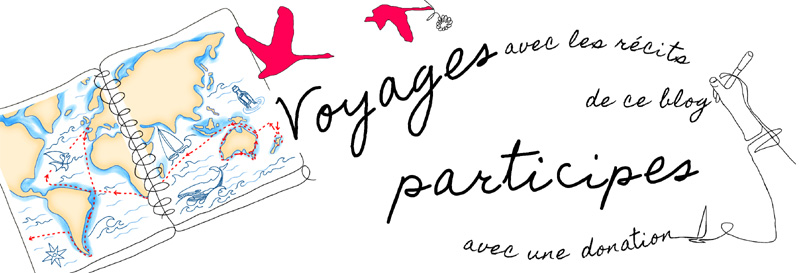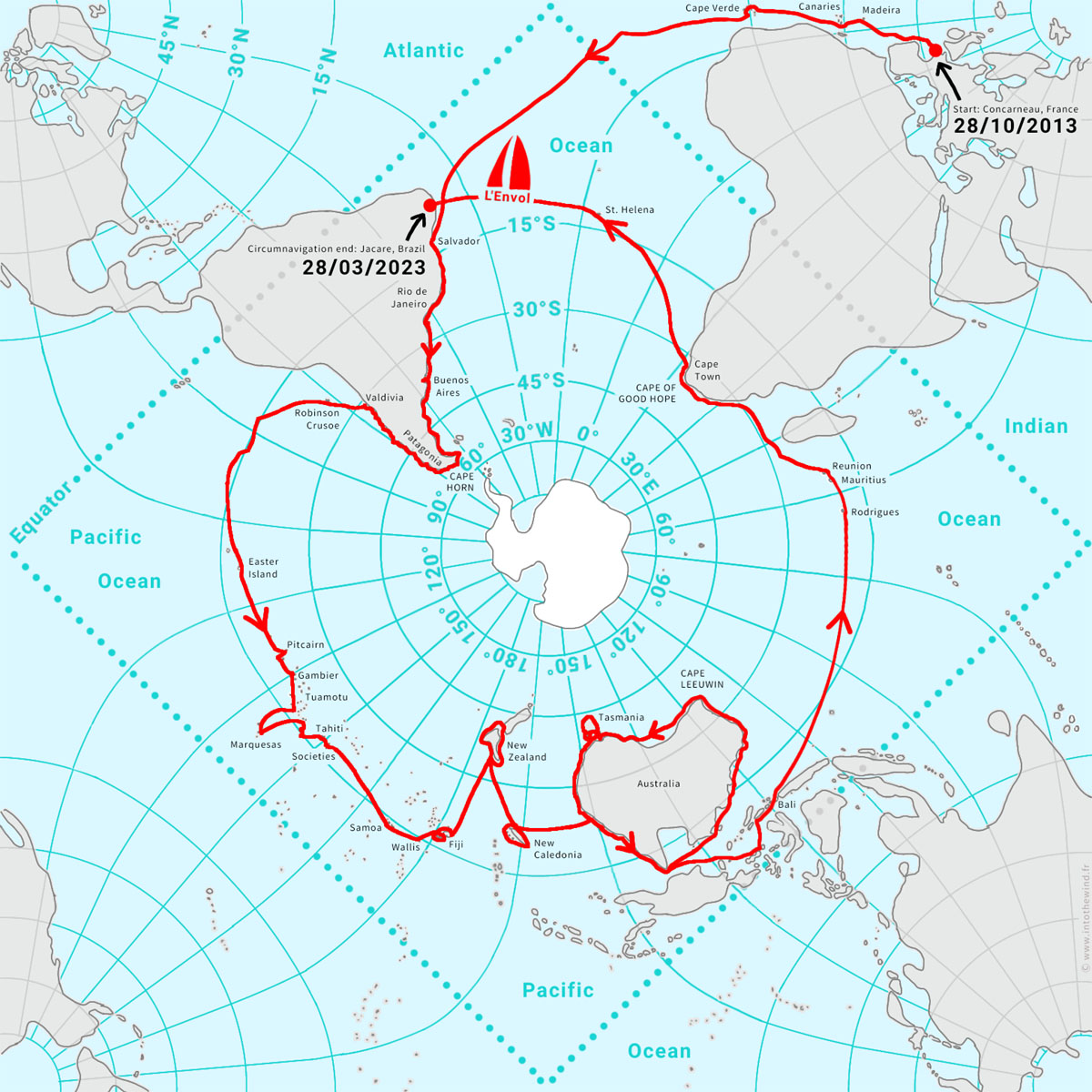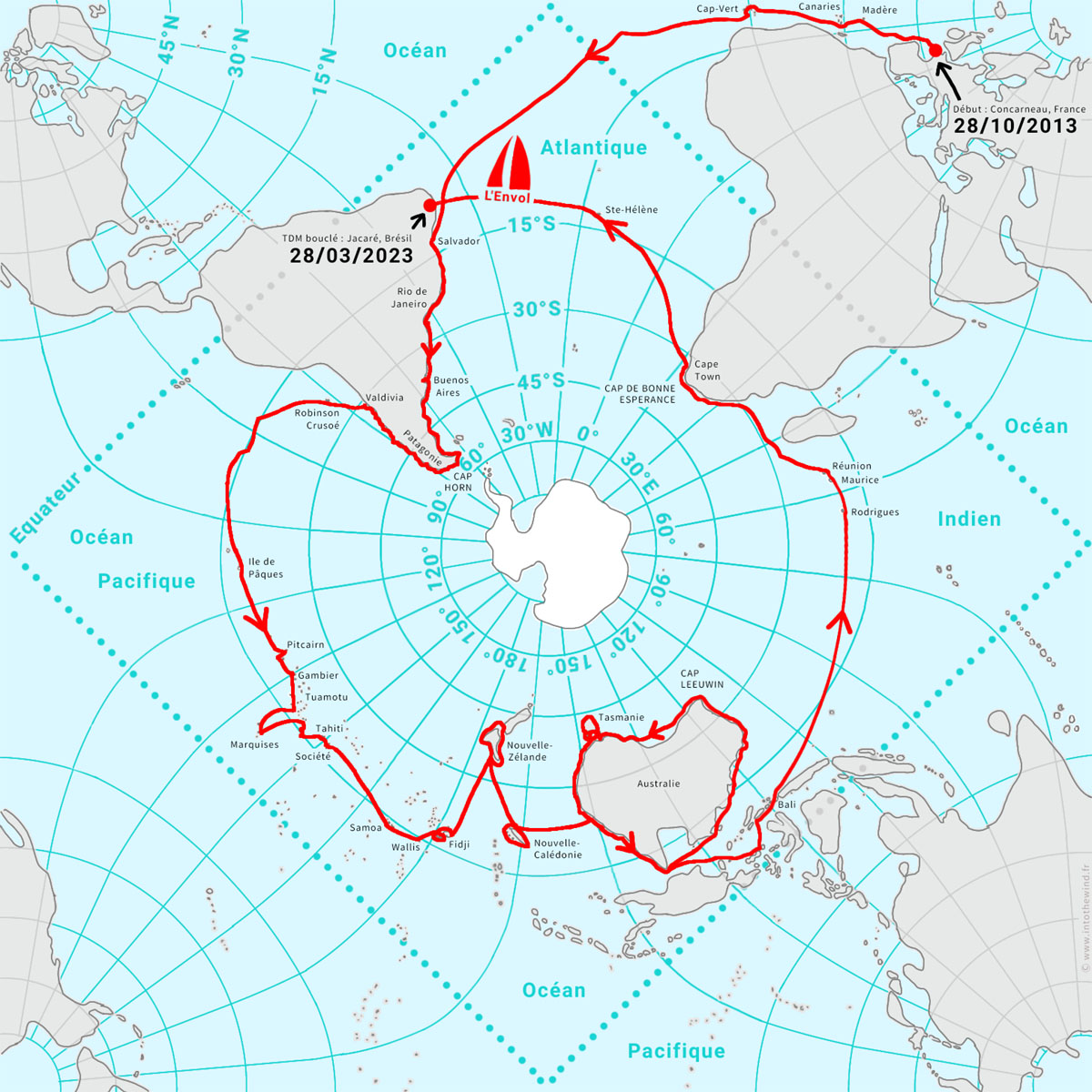Charte du voyage
For English click here
Values Statement
Voyage summary
On March 28, 2023, L’Envol looped the loop around the world. It was an westbound voyage pushed by the trades with three detours in the great south: rounding of the South American continent via the Patagonian channels, paying a visit to the Marlborough Sounds in New Zealand and a circumnavigation of Australia.
- itinerary completed by SY L’Envol of 7.7 metres (25-feet)
- aboard Christophe Mora and Carina Juhhova from France and Estonia
- 10 years afloat
- 50 000 nautical miles sailed
- +10 000 hours of sail time
- +600 anchorages
- 96% of the distance powered by wind in the sails
Why this values statement?
On land, man is no longer subject to any predation except from himself. At sea, we are exposed to the natural elements of the swell, the waves and the wind. Furthermore, yearning for the ultimate safety becomes pointless, because the true purpose of a voyage close to nature is all about finding our rightful place in it.
Against the capitalist system’s claim that anything is possible without due regard for ethics, we have made a conscious decision to set certain limits to our way of life afloat.
A circumnavigation in a yacht, yes but:
1. without ever taking a plane, which stands for
no return to Europe since L’Envol cast off from France on October 28, 2013
2. without ever buying or hiring a car, which stands for
plenty of hitchhiking, public transport and walking
3. without connection to terrestrial electricity grids, which stands for
generating our own energy thanks to one solar panel and a hydrogenerator
without using coal, oil or nuclear power
4. without power-hungry equimpent aboard, which stands for
no air conditioner, freezer, fridge or water heater
5. without wasting drinking water resources, which stands for
3 litres of drinking water per person per day + 1 litre shower
6. without lengthy stays in marinas, which stands for
swinging at anchor wherever possible
7. without succumbing to have land-lubbers’ creature-comforts aboard,
which stands for
the choice of a small size ship, basic gear and a minimalist lifestyle
8. without an inboard engine, just an outboard, adding up to 1200 litres of fuel burnt in 10 years (half of it in Patagonia), which stands for
reducing the usage of petroleum products to an equivalent of two car tanks of fuel each year
9. without a dinghy engine or an electric windlass, which stands for
rowing ashore weather and/or current depending,
upping anchor by hand, need be, with the help from the mainsail
In order to emphasize our own responsibility before all choices and their consequences:
10. without insurances nor EPIRB distress beacons, which stands for
anticipating potential issues by minimising risks and when, one time, worse came to worst, we found another way
Respecting this 10-point values statement has enabled us to:
- enjoy life before retirement without becoming (too) dependent on the material and financial aspects of the trip
- develop a method of navigation, collection of information, organisation and decision-making that leaves little to chance
- be respectful of the livelyhoods of local populations – instead of underlining world’s disparities and creating the feeling of desire and envy, we were rather treated like a curiosity where the gain was not money but the mutual discovery of our diverse cultures
- have a negligible impact on our planet, with an infinitesimal carbon footprint
- be coherent with ourselves without yielding to the myth of infinite growth on a finite planet
What are the results?
Even though these limitations have not prevented us from sailing around the globe for a decade, one must recognise, it has come at the cost of considerable stress.
So here is the insurmountable paradox of it all: on one hand, respecting these values has motivated and refined this travel project; on the other, such ethics have also become its venom slowly and insidiously eroding my captain’s psychological resources.
And yet the desire for this lifestyle stays intact, so will it be possible for us to continue sailing or not, is now the question.
To be continued…
Although this values statement focuses on the «withouts», nothing would have been possible without the «withs»: short inventory speaks of those, describing our technical choices.Close
Le voyage en résumé
Le 28 mars 2023, L’Envol bouclait la boucle autour du monde. Un périple d’Est en Ouest dans les alizés avec trois digressions dans le grand Sud : le contournement du continent Sud-américain avec la remontée des canaux de Patagonie, la visite des Marlborough Sounds en Nouvelle-Zélande et une circumnavigation de l’Australie.
- un parcours réalisé par L’Envol, un voilier de 7,70 m (25 pieds)
- à bord, Christophe Mora et Carina Juhhova, un français et une estonienne
- 10 ans de voyage sur l’eau
- 50’000 milles nautiques parcourus
- +10’000 heures de navigation
- +600 mouillages
- 96% de la distance faite à la voile
Pourquoi une charte ?
A terre, l’Homme ne fait plus l’objet d’aucune prédation si ce n’est de lui-même. En mer, nous sommes exposés aux éléments naturels que sont la houle, les vagues et le vent. Pour autant, vouloir s’en préserver complètement n’aurait pas de sens, car le véritable but du voyage dans la nature, c’est de nous permettre d’y retrouver notre juste place.
Prenant à contre-pied le système capitaliste qui prétend que tout est possible sans considération éthique, nous avons fait le choix délibéré de fixer des limites à notre manière de vivre.
Un tour du monde en voilier, oui mais :
1. sans avion, ce qui signifie
pas de retour en Europe depuis que L’Envol a largué ses amarres le 28 octobre 2013
2. sans achat ou location de voiture, ce qui signifie
une pratique assidue du stop, des transports en commun et de la marche à pied
3. sans connexion aux réseaux électriques terrestres, ce qui signifie
produire sa propre énergie grâce à un panneau solaire et un hydrogénérateur
sans recours au charbon, au pétrole, au nucléaire
4. sans équipements énergivores à bord, ce qui signifie
sans climatisation, congélateur, frigo ou chauffe-eau
5. sans gaspillage de la ressource en eau potable, ce qui signifie
3 litres d’eau potable par personne et par jour + 1 litre pour la douche
6. sans séjours en marina injustifiés, ce qui signifie
être au mouillage forain, éviter sur son ancre partout où c’est possible
7. sans chercher à emmener tout le confort de sa maison avec soi, ce qui signifie
le choix d’un petit bateau, d’un équipement minimaliste et d’une vie sobre
8. sans moteur inboard mais avec un hors-bord – en 10 ans, 1’200 litres d’essence ont été consommés (dont la moitié dans les canaux de Patagonie), ce qui signifie
pas d’abus des produits pétroliers avec l’équivalent de deux pleins automobile chaque année
9. sans moteur d’annexe ni guindeau électrique, ce qui signifie
ramer pour débarquer en tenant compte de la météo et/ou des courants,
remonter son ancre à la main, s’il le faut épaulé par la grand-voile
Et afin de magnifier la responsabilité de ses choix et de leurs conséquences :
10. sans assurances ni balise de détresse EPIRB, ce qui signifie
prévenir les problèmes potentiels en minimisant les risques et quand, une fois, le pire est arrivé, nous avons trouvé une autre façon de faire
Le respect de cette charte en 10 points nous a permis :
- de profiter de la vie avant la retraite sans devenir (trop) esclave des aspects matériel et financier du voyage
- de développer une méthode de navigation, de recueil d’informations, d’organisation et de prise de décisions qui laisse peu au hasard
- d’être respectueux de la vie des populations locales – au lieu de souligner les inégalités du monde et de créer un sentiment de désir et d’envie, nous avons plutôt été traités comme une curiosité où le gain n’était pas l’argent mais la découverte mutuelle de nos différentes cultures
- d’avoir un impact négligeable sur notre planète avec une empreinte carbone infinitésimale
- d’être en cohérence avec nous-mêmes sans céder au mythe d’une croissance infinie sur une planète finie
Quel bilan ?
Ces limitations ne nous ont pas empêché de naviguer autour du globe une décennie mais, il faut bien le reconnaître, au prix d’un stress considérable.
Il y a comme un paradoxe insurmontable : d’un côté le respect de cette éthique a motivé et sublimé ce projet de voyage, de l’autre il a été son venin par la lente et insidieuse érosion de mes ressources psychiques.
Le désir pour ce style de vie est quant à lui resté intact, alors sera-t-il possible de poursuivre sur l’eau ou pas, telle est la question.
A suivre…
Cette charte se cantonne aux « sans », mais rien ne serait possible sans les « avec » : Un court inventaire s’intéresse à ces derniers, une page qui parle de nos choix techniques.
————–
La trace GPS du bateau, nos traces GPS à terre (en trek, en stop…) et nos waypoints d’escales sont visibles et téléchargeables gratuitement à partir de cette carte du voyage interactive. Sur un fond d’images satellites, vous pouvez zoomer, vous déplacer et cliquer sur les traces et les escales de L’Envol pour obtenir plus d’information.
Article publié le 28/08/2024 depuis L’Envol, baie de Chingoudy, Hendaye, France, GPS 43 22.13 N 1 46.46 W

Envie de nous donner un coup de main ? Visites la page de financement participatif de L’Envol : www.intothewind.fr/crowd-funding/

